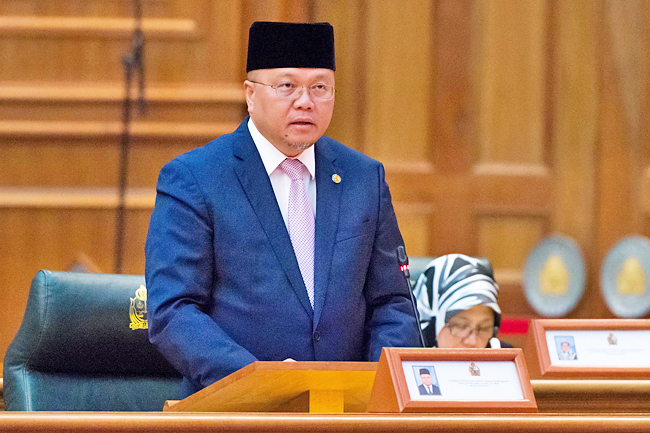Izah Azahari
The budget for the Ministry of Health (MoH) in the financial Year 2023-2024 is themed ‘Health is Everyone’s Responsibility’, in line with the national budget theme of ‘Building a Prosperous Future Together’, said Minister of Health Yang Berhormat Dato Seri Setia Dr Haji Mohd Isham bin Haji Jaafar in his adjournment speech during the final day of the 19th Legislative Council session yesterday.
He added that the theme carries a meaning for the MoH to embrace together, as it outlines how important preparedness is achieved by using resources in a more economical and efficient manner.
The minister shared that the supported budget for the year 2023-2024 is BND418,098,270.
The increase of 8.3 per cent from the approved budget in the previous financial year is due to rising drug market prices, increasing healthcare costs, and the growing number of patients.
Throughout the financial years 2021-2022 and 2022-2023, the MoH has implemented several projects aimed at improving the quality of life to achieve the goals of Brunei Vision 2035. Among them were to support the development of the Industrial Revolution 4.0 in providing a high quality of life, on par with developed countries through digital transformation in healthcare services.
The use of the BruHealth app has now been expanded through the BruHealth Phase II and III projects, with the addition of features such as allowing patients to access their medical records including laboratory and X-ray test results, clinic appointments and tele-consultations, as well as strengthening the data generation system.
The minister hoped the success will serve as a catalyst for the Sultanate to continue moving forward in line with modernisation.


In promoting a healthy lifestyle, the minister shared the ministry’s active implementation and planning of various programmes, campaigns and initiatives such as BN on the Move, while to further enhance patient’s safety, the ministry launched the Picture Archiving and Communication System (PACS) on October 3, 2022, allowing patients’ medical records, X-ray images and ECG to be accessed at any government healthcare facility and will be extended to private healthcare facilities, to speed up clinical work processes.
In addition to PACS, several digital technology achievements in other services have also been initiated, such as the use of computer-assisted design (CAD) machines in the dental service, therapy data management system (TDMS) in the dialysis service, and the addition of CT Scan machines for the radiology service, especially to meet the needs in other districts besides, Brunei-Muara.
The minister said the MoH is also researching advanced technology for early detection and treatment of diabetes-related issues, including diabetic retinopathy.
The establishment of the Intelligence Hub, which includes the Epidemic Intelligence and Response Unit; the Climate Change Adaptation and Resilience Unit; and the Digital Health Unit, is among the MoH’s efforts to strengthen the healthcare system where data generated will help the MoH to develop strategies to ensure health safety.
Towards the strengthening of a stable national healthcare system with expertise tailored to needs, the minister shared the financial year 2022-2023 has recorded 806 doctors and dentists; 2,557 nurses; and 416 other allied healthcare professionals under the MoH compared to the financial year 2020-2021 which saw 738 doctors and dentists; 2,517 nurses; and 313 other allied healthcare professionals.
He added that with the increase in the number of healthcare professionals, several healthcare services have been further developed in various disciplines including sports medicine, palliative care, infectious diseases expertise, and organ transplantation services, particularly kidney transplants.
The minister also noted infrastructure development in the public health sector under the 11th National Development Plan (RKN 11) such as the new block construction project of the Jubli Perak Health Centre in Sengkurong expected for completion in April; construction of a new emergency services building at the Suri Seri Begawan Hospital in the Belait District that will begin shortly and is expected for completion by mid-next year; and the olecular Diagnostic Clinical Laboratory for Infectious Diseases in the Tutong District which has been completed.
“The MoH still faces challenges that need to be addressed in order to maintain the resilience of the healthcare system and to achieve the goals of Brunei Vision 2035 towards a country with a high quality of life for its people,” said the minister. The challenges include the increase in the prevalence of non-communicable diseases (NCDs); mental health issues; increasing health expenditure, especially in the cost of purchasing medications and providing medical equipment; and the need to always be prepared for public health threats such as pandemics, natural disasters and chemical accidents.
In the financial year 2022-2023, the minister said as of January 2023, 95 per cent of clinical vacancies have been identified and committed to being filled.
He added the ministry will continue to address the challenges to ensure that the filling of vacancies can be carried out in a timely manner. Taking into account that the RKN 11 has been extended for another year, the minister said MoH has identified two main projects planned under RKN 12 to be expedited in RKN 11.
These projects are the construction of a new block at Raja Isteri Pengiran Anak Saleha Hospital and the Bru-HIMS 2.0 system project.
In carrying out its role and responsibilities, the main goal of the MoH through the Strategic Plan 2019-2023 is to achieve: excellence in healthcare services; prevention and control of NCDs; public health protection through effective policies and regulations; sustainability through resource optimisation and innovation; and transparent and proactive governance.
To achieve these objectives, the MoH will focus on six clusters: improving the quality of healthcare services to the public; continuously assessing whether services are better managed internally or outsourced; enhancing the screening of infectious and NCDs; enhancing laboratory service capability with advanced and sophisticated laboratory testing; enhancing cooperation with the private sector through public-private partnership (PPP) via the fiscal consolidation programme (FCP); and improving government revenue through efficient revenue collection practices and providing access to services and treatment.
The minister said the MoH is committed to providing the best healthcare services such as ensuring an adequate supply of medicines and medical equipment; carrying out maintenance of medical equipment; and maintaining healthcare facilities that are safe for patients, professionals, and healthcare workers.



















































